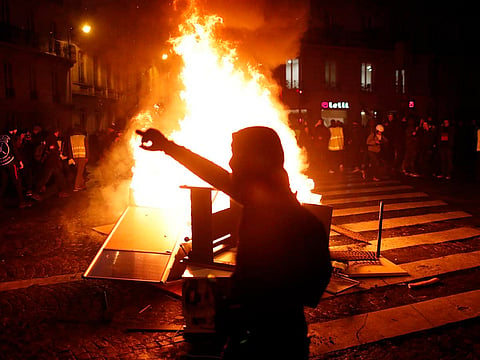Why exactly did France erupt in riots recently?
Despite reforms aimed at sensitive neighbourhoods in Paris, the problems still fester

In the sprawling housing projects that ring many French cities, heavily populated by working-class minorities, the rage is rarely far from the surface. It is often directed at the police.
That simmering fury erupted in waves of violence in suburbs and cities across France last week after police shot to death a 17-year-old boy named Nahel M., from a family of North African origin, in a town just west of Paris. Video of the incident, which went viral almost instantly, showed a policeman opening fire as the boy started to pull away from two motorcycle officers who had stopped his car. Nahel was unarmed.
French police discharge their weapons and kill civilians at a fraction of the rate their US counterparts do, and many people in France tend to regard violence and racism by law enforcement as mainly an American problem. Many White people in France, that is.
Among migrants and their children, most of them from North and sub-Saharan Africa, hard feelings toward law enforcement have run deep for years, and many regard police bigotry as a symptom of bias in French society generally.
Overall discrimination
In a recent survey of Black and mixed-race residents of France, 9 in 10 said they had encountered racial discrimination, and roughly half said they had been stopped and asked for their identification — more than twice the share of the overall population who reported the same thing. In the first months of the pandemic lockdown, a survey by Reuters found that in France’s five departments with the greatest percentage of immigrants, police issued fines at a rate more than 50 per cent higher than elsewhere in the country.
Such routine racial profiling is a quotidian reality for millions of residents who, even if they were born in France or have lived here for decades, often are made to feel not fully French. For years, researchers have documented discrimination in hiring and schools and on the streets.
That was the social kindling lit by the death of Nahel on Tuesday, which ignited riots in and around Paris, Marseille and other major cities. France has been set ablaze — cars incinerated, buildings torched, incendiary devices hurled at police in riot gear. Shops and stores have been looted, ATMs demolished, windows smashed.
President Macron surely knows, he has been forced to address symptoms, not causes, of France’s inequity — schisms with roots in the country’s colonial past that have been papered over for decades by a policy of official colour blindness untethered to real people’s lives. Under French law, data collection on race and ethnicity is strictly limited, meaning that the government — which, for instance, publishes no information on the racial or ethnic composition of its police — operates in a state of self-imposed ignorance and denial.
For minority residents of France, however, the absence of data is irrelevant. Their lived reality is evidence of actual bias — even if Macron has previously asserted there is no systemic racism in the police.
“This is a moment for the country to seriously address the deep issues of racism and discrimination in law enforcement,” UN human rights office noted in Geneva.
Duty-bound to protect
Similarly anodyne calls for France to grapple with those dilemmas are all too familiar. They were issued with numbing regularity even before the resentments of the country’s migrant communities exploded into weeks of anarchy in 2005, after two teenagers were electrocuted inside an electrical substation where they had fled following a confrontation with police.
It didn’t help that the interior minister at the time — Nicolas Sarkozy, who later became president — referred to the rioters, many of them from migrant families, as “gangrene”.
In that instance, the government declared a state of emergency to contain the crisis after nearly two weeks of running street battles between rioters and police, often set against a tableau of flaming cars. The emergency lasted two months, enabling the authorities to impose curfews and regain control of the streets.
Yet despite the ensuing years of reforms, including programmes targeted at the cities and neighbourhoods that burnt in 2005, the problems still fester. And the police remain reviled by communities they are duty-bound to protect.
Washington Post
Lee Hockstader is a journalist based in Paris. He focuses on European affairs


